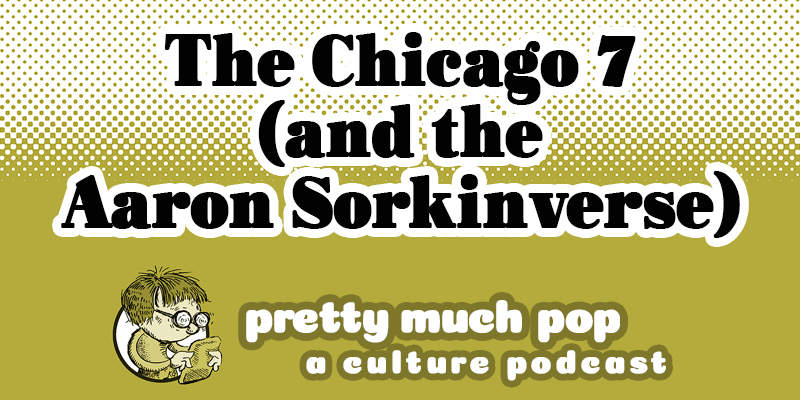The Trial of the Chicago 7 and the Oeuvre of Aaron Sorkin: An Assessment by Pretty Much Pop: A Culture Podcast (#89)

In lieu of an Oscars episode, the Pretty Much Pop podcast this week considers one of the nominated films, The Trial of the Chicago 7, and the career of its writer/director, Aaron Sorkin, which started with A Few Good Men through four TV series (most notably The West Wing), and films like The Social Network, Steve Jobs, and Molly’s Game.
Your hosts Brian Hirt, Erica Spyres, and Mark Linsenmayer consider Sorkin’s stock recurring characters and their political diatribes, plots often based on true events, and how his writing creates drama. Do we feel uplifted or vaguely dirty after a Sorkin bath? It’s great to have characters that aren’t stupid, but are they actually smart or just designed to seem that way? Are the deviations from fact just good use of dramatic license or positively harmful? We touch on virtually all of Sorkin’s productions (well, except for the plays; he actually considers himself natively a playwright) and still have energy for a few Oscars musings and reflections about including real locations or news events in fiction.
Here are some articles we used to prepare ourselves:
- “Here’s Every Aaron Sorkin Movie Ranked from Worst to Best” by Adam Chitwood
- “The Everything Aaron Sorkin Ranking” from The Ringer
- “Aaron Sorkin Talks Creating Chaos In and Outside of the Courtroom in Netflix’s ‘The Trial of the Chicago 7’” by Megan McLachlan
- “Aaron Sorkin Had No Idea His Latest Project Would Be Quite So Relevant in 2020” by Merle Ginsberg
- “Aaron Sorkin on How He Would Write the Democratic Primary for ‘The West Wing’” by David Marchese
- “Writers on Writing: Aaron Sorkin” by M. Olchawska
- “The West Wing is 20 years old. Too many Democrats still think it’s a great model for politics.” by Emily VanDerWerff
- “Aaron Sorkin apologizes for ‘The Newsroom’” by Patrick Kevin Day
- “Aaron Sorkin Breaks Down His Career, from ‘The West Wing’ to ‘The Social Network’” (video)
Hear more of this podcast at prettymuchpop.com. This episode includes bonus discussion that you can access by supporting the podcast at patreon.com/prettymuchpop. This podcast is part of the Partially Examined Life podcast network.
Pretty Much Pop: A Culture Podcast is the first podcast curated by Open Culture. Browse all Pretty Much Pop posts.
The Trial of the Chicago 7 and the Oeuvre of Aaron Sorkin: An Assessment by Pretty Much Pop: A Culture Podcast (#89) is a post from: Open Culture. Follow us on Facebook, Twitter, and Google Plus, or get our Daily Email. And don't miss our big collections of Free Online Courses, Free Online Movies, Free eBooks, Free Audio Books, Free Foreign Language Lessons, and MOOCs.
from Open Culture https://ift.tt/2Q8kZol
via Ilumina
Comments
Post a Comment